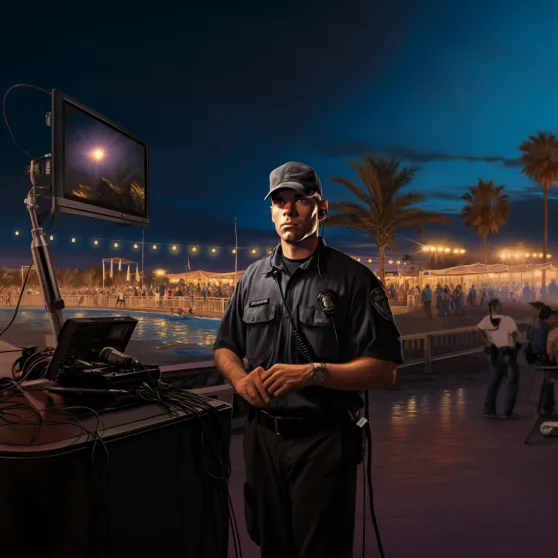
Empowering Safety, Enabling Success.
Welcome to the Excell Security Blog, your go-to source for the latest insights, trends, and expert advice on all things security. At Excell Security, we understand that safety is paramount, and our mission is to empower individuals, businesses, and communities with the knowledge and solutions needed to protect what matters most. Our blog is designed to be your trusted resource, offering a wealth of information on security strategies, industry updates, and success stories from our satisfied clients. Whether you're a security professional seeking to stay ahead of the curve or a concerned individual looking to enhance your safety, you've come to the right place. Explore our blog, and join us in our commitment to safeguarding lives and assets, one informative post at a time. Your safety journey starts here.

The Ultimate Checklist for Ensuring Event Security and Safety
The Ultimate Checklist for Ensuring Event Security and Safety
Planning a successful event involves more than just organizing schedules and booking entertainment. Ensuring the safety and security of your attendees is paramount. Whether it’s a small gathering or a large festival, proper security measures are essential to a smooth and incident-free event. To help you navigate the complexities of event security, we’ve put together a comprehensive checklist to guide you through the process.
1. Risk Assessment
Before diving into the planning phase, conducting a thorough risk assessment is crucial. This involves:
Identifying Potential Risks: Analyze your event’s location, size, and type to identify potential risks. These could include crowd surges, fire hazards, weather-related issues, or even specific threats related to the event’s nature (e.g., protests or high-profile attendees).
Evaluating Historical Data: Review past incidents at similar events or venues. This can provide insights into common issues and necessary precautions.
Engaging Stakeholders: Consult with local law enforcement, emergency services, and venue management. Their experience and knowledge can help you foresee potential risks and plan accordingly.
Documenting Findings: Create a risk assessment report that details identified risks, their potential impact, and recommended mitigation measures. This document will guide your security planning and decision-making process.
2. Hire Security Personnel
Ensuring that you have the right security team is essential for managing the safety and smooth operation of your event:
Assess Staffing Needs: Determine the number of security personnel required based on the size of your event, venue layout, and the potential risks identified in your assessment. Consider factors such as crowd density, access points, and potential high-risk areas.
Select Qualified Professionals: Hire security guards who are not only licensed but also experienced in managing similar events. Look for individuals with a background in crowd control, emergency response, and customer service.
Brief and Train Security Team: Conduct a thorough briefing session with your security team. This should include an overview of the event, specific roles and responsibilities, emergency procedures, and communication protocols.
Specialized Roles: Depending on the event, you may need specialized security personnel such as event coordinators, canine units, or tech-savvy staff for surveillance. Ensure these roles are filled by professionals with the appropriate expertise.
Integration with Event Staff: Ensure your security team is well-integrated with other event staff. They should be familiar with event logistics and coordinate with staff to manage security effectively.
3. Security Plan
A comprehensive security plan is vital to ensuring that all security measures are effectively implemented:
Develop a Detailed Plan: Outline all security measures, including access control, crowd management, and emergency procedures. Include specific details such as security checkpoints, patrol routes, and locations for medical and emergency services.
Emergency Protocols: Establish clear protocols for different types of emergencies, including medical incidents, fire, or disturbances. Detail the steps for evacuation, communication with emergency services, and how to manage and inform attendees.
Coordination with Authorities: Ensure your security plan is shared with local law enforcement and emergency services. Their input can help refine your plan and ensure it aligns with local regulations and response procedures.
Communication Strategy: Develop a communication strategy that includes how information will be relayed to security personnel, event staff, and attendees. This includes emergency alerts, updates, and instructions.
Regular Reviews and Updates: Continuously review and update your security plan as the event approaches. Incorporate any new information or changes in the event scope that may affect security. Review the plan after the event and make updates before the next event.
By expanding on these critical areas, you can enhance your event’s security and ensure a safe environment for all attendees.
Proper planning and preparation are key to managing and mitigating risks effectively.

Event Security and Safety Quick Checklist
Risk Assessment: Evaluate potential risks.
Hire Security Personnel: Ensure adequate trained guards.
Security Plan: Develop and review a security strategy.
Test Security Equipment: Check cameras, detectors, alarms.
Access Control: Set up entry and exit systems.
Emergency Response Plan: Prepare procedures for emergencies.
Coordinate with Authorities: Inform local law enforcement.
Safety Drills: Conduct drills for staff and security.
Venue Security: Check for vulnerabilities.
Safety Information: Communicate to attendees.
First Aid Stations: Set up medical support.
Monitor Weather: Have contingency plans for weather.
Lost and Found: Establish a handling system.
Lighting: Ensure adequate venue lighting.
Insurance Coverage: Verify appropriate policies.
Emergency Services: Coordinate with fire and medical teams.
Crowd Control: Implement crowd management strategies.
Parking Security: Monitor parking areas.
Communication Systems: Test radios and phones.
Post-Event Review: Analyze and address security issues.
Use this checklist to ensure your event runs smoothly and securely!
Hear From Our Customers

Kerry Payne

We cannot thank you enough for your immediate attention and security service last week - a time when we were extremely concerned for our tenants safety and Main Street Plaza.

March of Dimes

I just wanted to take a moment to say how pleased we were with your security team at our March for Babies event. They were both incredibly helpful, kind, and professional. We received compliments from several vendors, city staff, and walkers about them.

Chris George

XL has been consistently dependable in responding to and meeting our security needs at multiple locations. Whether long-term or just for a weekend, the XL Team is always prepared to cover every gap.XL has been consistently dependable in responding to and meeting our security needs at multiple locations. Whether long-term or just for a weekend, the XL Team is always prepared to cover every gap.

© 2025 Excell Security, Inc. • PPO 16051 • All Rights Reserved.
general@xlstaffing.com
619-579-0442
